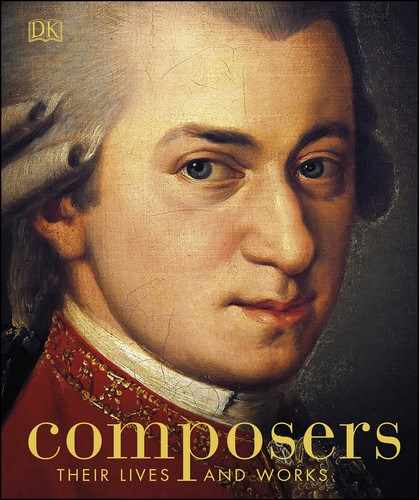Nikolai Rimsky-Korsakov
1844–1908, RUSSIAN
Propelled by Russian nationalist sentiment in the 1860s, Rimsky-Korsakov was an influential teacher as well as a composer, and became a standard-bearer for culture in late Czarist times.

NIKOLAI RIMSKY-KORSAKOV
The composer, a master of orchestration who incorporated Russian folklore into his music, is portrayed here by the renowned portraitist Valentin Serov.
IN PROFILE
Savva Mamontov
Pre-Revolutionary Russia, although backward by the standards of Western Europe, was changing fast toward the end of the 19th century. The economy grew in harness with the expansion of the railroads, as did the cultural life of the major cities. The railroad tycoon Savva Mamontov (1841–1918) made a fortune and spent much of it on his Moscow Private Opera company. Mamontov’s money bankrolled a long run of Rimsky-Korsakov operas, beginning in 1897 with Sadko and expanding (even after Mamontov was unjustly imprisoned for embezzlement two years later) to include such works as The Czar’s Bride, in 1899, and Kashchey the Immortal, in 1902.

PORTRAIT OF SAVVA IVANOVICH MAMONTOV, 1879
Nikolai Rimsky-Korsakov belonged to the generation of Russia’s “secular priesthood,” as the philosopher Isaiah Berlin described the country’s mid-19th-century intelligentsia, that contested and shaped ideas of Russian national identity. He was born on March 18, 1844, in the provincial town of Tikhvin to a noble family. Music played an important part in his childhood, helped by his ability to repeat overheard melodies at the piano. The boy’s older brother, however, encouraged him to join the Imperial Russian Navy, and in 1856 young Nika enrolled at the College of Naval Cadets in St. Petersburg. The move introduced him to the capital city’s vibrant musical scene and, above all, to its captivating opera productions.
Private lessons in music theory and composition led to an introduction in 1861 to the composer Mily Balakirev, an ardent champion of nationalism in Russian music and leader of a select group of like-minded musicians. Balakirev became Rimsky-Korsakov’s musical mentor and immediately instructed him to write a symphony. However, in 1862, midshipman Rimsky-Korsakov set sail on the clipper Almaz for a three-year term of service. On his return to St. Petersburg in the summer of 1865, he completed his Symphony No. 1 in E minor, Op. 1, ready for Balakirev to polish its contents and conduct its premiere at the city’s Free Music School on December 31, 1865.

ON THE HIGH SEAS
Rimsky-Korsakov’s (front row, right) three-year voyage on the clipper Almaz confirmed in him a love of the sea, which he expressed in many of his operas and symphonic works.
Russian-flavored music
Rimsky-Korsakov’s light onshore duties left ample time for composition. His Fantasia on Serbian Themes, first heard at the Moscow Slavonic Conference in 1867, reflected its composer’s solidarity with Slavs in Russia and beyond. The critic Vladimir Stasov responded with affection by dubbing Rimsky-Korsakov and his fellow nationalist composers—namely Balakirev, Alexander Borodin, Modest Mussorgsky, and César Cui—as Moguchaya kuchka, or the Mighty Handful, a group that was often known outside Russia as The Five.
While completing his first opera, The Maid of Pskov, Rimsky-Korsakov became a professor of composition at the St. Petersburg Conservatory. He remained on the staff until his death on June 21, 1908. His composition students included Lyadov, Glazunov, Tcherepnin, and Myaskovsky; Stravinsky, meanwhile, was among Rimsky-Korsakov’s private pupils.
Stasov’s writings on native Russian art and folk traditions encouraged Rimsky-Korsakov to explore the legends of Russia’s past. Sadko (1897), both as an orchestral work and as an opera, and the opera The Tale of Czar Saltan (1900) grew from ideas suggested by Stasov. The melodies and harmonies of works such as the symphonic suite Scheherazade (1888) and the operas Mlada (1890) and The Golden Cockerel (1907) were enhanced by the composer’s genius for orchestration and ability to reform his style without smashing the boundaries of convention.
